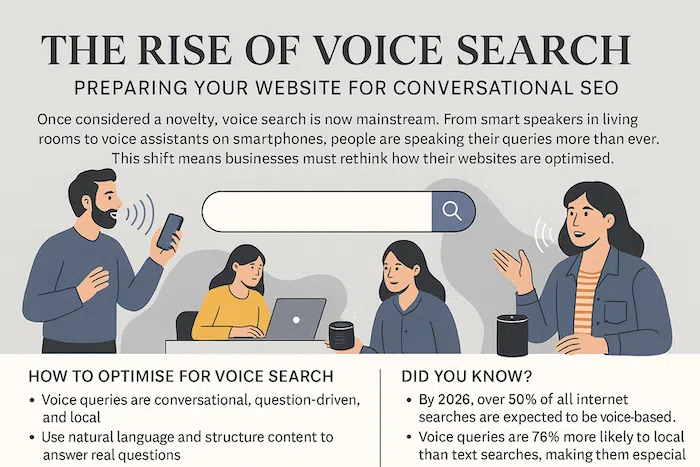Thursday, September 18, 2025 |
Why Voice Search Is Changing the Game
Once considered a novelty, voice search is now mainstream. From smart speakers in living rooms to voice assistants on smartphones, people are speaking their queries more than ever. This shift means businesses must rethink how their websites are optimised.
Voice queries aren’t typed keywords, they’re conversational, question-driven, and local. Where a user might type “plumber Birmingham” into Google, the spoken version is more likely to be “Who’s the best plumber near me right now?” For small and medium-sized businesses, adapting to this new search behaviour is no longer optional.
How to Optimise for Voice Search
The first step is understanding that voice search is built on natural language processing. Search engines are now less focused on individual keywords and more on the intent behind the question.
This means your content needs to be structured in a way that answers real questions. Creating FAQ pages, blog posts framed around “how,” “what,” and “where” queries, and using conversational phrases throughout your site all help position your business for voice search.
Local optimisation is equally critical. Ensure your Google Business Profile is up to date with correct contact details, opening hours, and customer reviews. Adding location-specific schema markup to your site makes it easier for search engines and by extension, voice assistants to recommend your business when users ask “near me” queries.
Why It Matters for SMEs
For small businesses, voice search represents an opportunity to be discovered at the exact moment a customer is ready to act. If someone asks Alexa or Google Assistant for a “coffee shop open now” or a “local marketing agency near me,” and your business isn’t optimised for voice, you risk losing a ready-to-convert customer to a competitor who is.
Did You Know?
- By 2026, over 50% of all internet searches are expected to be voice-based.
- Voice queries are 76% more likely to be local than text searches, making them especially important for SMEs serving specific areas.
Final Thoughts
Voice search is no longer a futuristic concept – it’s here, and it’s changing how customers find local businesses. The good news is that SMEs can adapt by focusing on conversational content, local SEO, and user-friendly website structures.
Those who take voice search seriously today will have a clear advantage tomorrow, speaking directly to the customers who are already asking for them.
